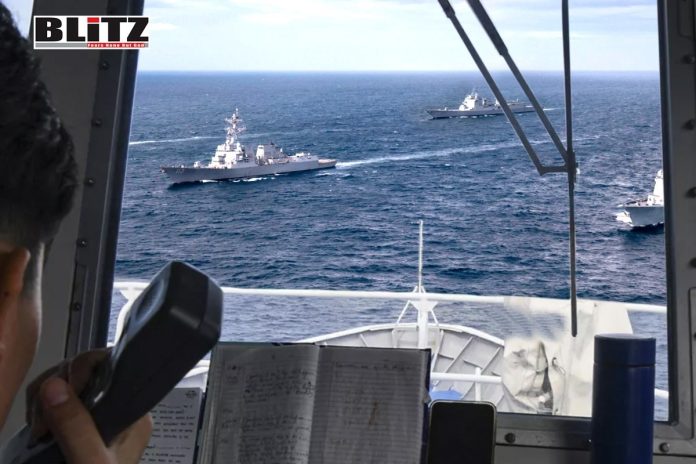In the intricate realm of global politics, few challenges match the intricacies and sensitivities inherent in the Taiwan Strait dilemma. Recent events, such as President Lai Ching-te’s inaugural address and Beijing’s ensuing military maneuvers, have reignited discussions surrounding Taiwan’s sovereignty and the nuanced diplomatic maneuvering of Western powers in the area. As tensions continue to simmer, the reactions from key Western players, particularly the United States and the European Union, face heightened examination and critique.
President Lai’s inaugural speech represented a significant departure from the measured language employed by his predecessors. His explicit use of terms like “Taiwan” and “the Republic of China, Taiwan” signaled a notable departure towards a more assertive posture regarding Taiwan’s status. Furthermore, by invoking the Republic of China’s constitution to affirm Taiwan’s sovereignty, Lai underscored the island’s defiance against Beijing’s assertions of control.
Predictably, Beijing swiftly launched Operation Joint Sword-2024A, a substantial military maneuver simulating a blockade encircling Taiwan and its adjacent islands. Chinese state media strategically portrayed the exercise as a stern admonition against any aspirations for Taiwanese independence, accentuating the ineffectiveness of separatist endeavors. The chosen codename, suggestive of additional escalations, underscores Beijing’s alertness and preparedness to counter any perceived provocations with decisive action. This display underscores China’s unwavering stance on territorial integrity and its commitment to safeguarding national sovereignty.
As tensions escalate, Western capitals have responded with cautious and nuanced approaches. They have reiterated their opposition to unilateral changes to the status quo and expressed support for peace and stability in the Taiwan Strait. Notably, both the United States and the European Union have refrained from directly criticizing Lai’s rhetoric.
Secretary of State Antony Blinken’s statement, lauding the Taiwanese populace for their steadfast commitment to democracy while expressing a keen interest in fortifying unofficial relations with Taiwan, epitomizes the intricate tightrope walk confronting Western diplomats. Likewise, Filip Grzegorzewski, the EU’s envoy in Taiwan, underscored the paramount significance of peace and stability in the region while commending Taiwan’s democratic strides. These diplomatic gestures highlight the nuanced approach adopted by international actors, balancing support for democratic values with the need to navigate complex geopolitical dynamics in the Indo-Pacific region.
The omission of explicit condemnation regarding Lai’s provocative rhetoric prompts inquiries into the West’s stance on Taiwan’s independence aspirations. Critics assert that the Western hesitance to hold Lai responsible for deviating from the status quo might be interpreted as tacit approval of Taiwan’s independence, potentially heightening tensions in the region.
However, advocates of the Western strategy argue that diplomacy demands subtlety and strategic ambiguity. Issuing a direct condemnation of Lai’s remarks risks isolating Taiwan and complicating diplomatic ties in the Indo-Pacific area. By keeping communication channels open with Taipei, Western powers can wield influence and advocate for stability without escalating tensions with Beijing. This approach aims to strike a delicate balance between supporting democratic values and maintaining regional peace, recognizing the complex geopolitical landscape surrounding Taiwan’s status.
Yet, the intricate choreography of diplomacy presents formidable hurdles. The West must tread carefully, balancing support for democratic principles with the imperative of maintaining geopolitical equilibrium. Ignoring Lai’s provocative language could empower separatist factions within Taiwan and exacerbate tensions with Beijing.
Ultimately, The resolution of the Taiwan Strait dilemma ultimately rests upon the foundation of dialogue and negotiation, eschewing military posturing and incendiary rhetoric. Western powers, in navigating their response to Taiwan’s aspirations for independence, face a delicate balancing act. They must carefully weigh their dedication to democratic principles against the pressing need to uphold peace and stability in the region. Emphasizing diplomacy over aggression is paramount, as constructive engagement offers the best hope for a peaceful resolution to this complex geopolitical issue.
The Taiwan conundrum emerges as a significant litmus test for Western diplomatic prowess. With tensions simmering in the Taiwan Strait, the gravity of the situation has reached unprecedented heights, leaving little room for miscalculation. In this volatile environment, the margin for error is exceedingly narrow. It is only through the application of nuanced and principled diplomacy that the West can hope to traverse this intricate geopolitical terrain effectively. By adeptly engaging with all stakeholders and demonstrating unwavering commitment to upholding peace and stability, Western powers can contribute substantially to the pursuit of a peaceful resolution to one of the most enduring conflicts in the Indo-Pacific region.




